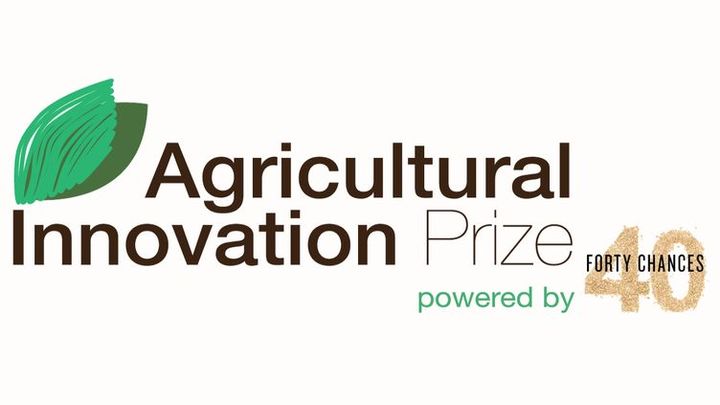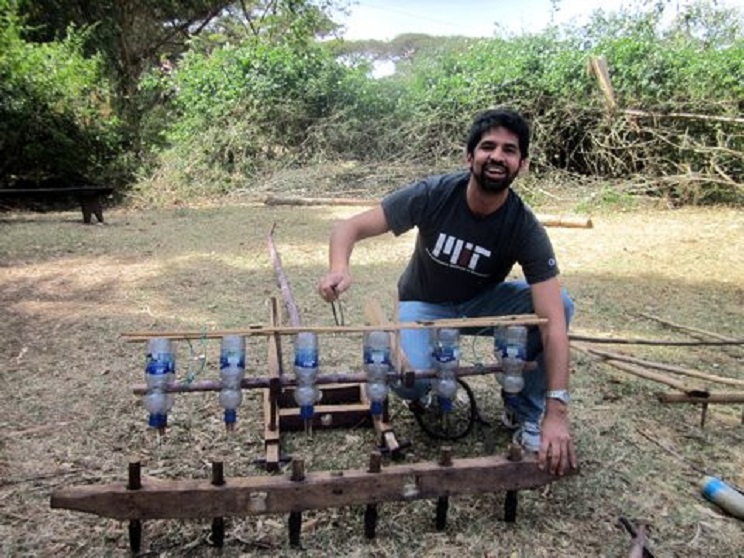
Established in 1999, the Howard G. Buffett Foundation (HGBF) is a private family foundation working to improve the standard of living and quality of life for the world’s most impoverished and marginalized populations. In 2006, the Buffet family also established 40 Chances, a spinoff of the HGBF that is dedicated to spending the next 40 years investing more than $3 billion to help the roughly 1 billion people on the planet that lack basic food security.
Last year, the HGBF, 40 Chances, and the University of Wisconsin-Madison came together with HeroX to launch the 2014 Agricultural Innovation Prize. With $215,000 in prize money, and a grand prize of $100,000, this contest was created to encourage graduate and undergraduate students to develop plans to address the problem of food security and hunger for people around the world.
Submissions opened on February 28th, 2014, and the competition wrapped up on April 25th. On April 26th, the winners were officially announced at the competition headquarters in Madison, Wisconsin. The top prize of $100,000 went to Coolify, a micro-cold storage business solution that seeks to empower food producers and reduce food waste by decentralizing the food storage market.
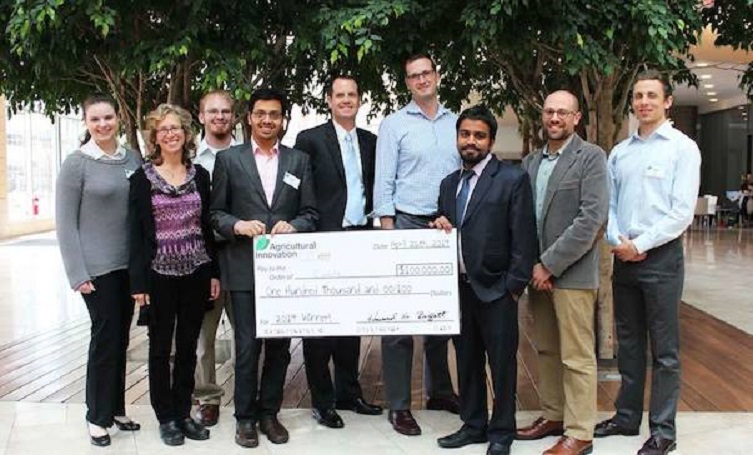
Team Coolify, the winners of the AIP top prize, pose with their check of $100,000. Credit: HeroX
Led by Rajat Sethi and Santiago Arias Duval from MIT and Ananth Raj Gudipati from Harvard University, the group seeks to set up cheap modular cooling storage units closer to harvest points in developing countries (primarily in India) to increase profits, prevent unnecessary spoilage, and allow producers to have a more direct role in the distribution process.
Coolify relies on a vacuum insulation panel technology that costs approximately $8,500 per unit, compared to $1.5 million for traditional bulk cold containers currently in use. With the top prize of $100,000 in their possession, the company plans to begin establishing pilot sites at critical locations in Asia to test their approach.
Outside of Coolify, five other finalist teams received $25,000 each from the Howard G. Buffet Foundation for their submissions. These include Middlebury Foods, a Vermont-based non-profit start-up that sells fresh produce and quality meat at "fast food prices" to local communities. Founded by Middlebury College students Nathan Weil and Elias Gilman, the program purchases healthy food and bundles them in monthly boxes, which they sell at delivery sites for approximately $1.50 per meal.
With their share of the prize money, the group intends to scale up their business model and investigate expanding it further. In addition to improving the eating habits of communities in Vermont, they intend to tackle the problems of both malnutrition and hunger.
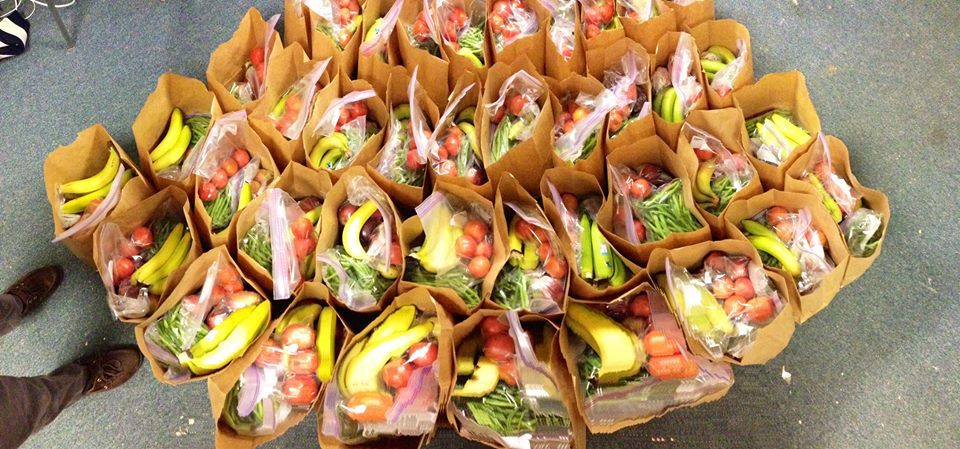
A monthly box, as provided by the Middlebury Foods program. Credit: Middlebury Foods
Ho’oulu Pacific (which in Hawaiian means "to grow", or "inspire") also took home a prize of $25,000 for their work in soilless farm technologies and the distribution of fish and vegetables to at-risk Pacific Island communities. Established by David Walfish, Ilima Ho-Lastimosa and Keith Sakuda of the University of Hawaii-West Oahu, the program offers counseling, nutrition education and entrepreneurial guidance in the art of distributed agriculture.
At present, their team has created over 70 systems in the Pacific Islands that produce more than 50 different types of vegetables, fruit, and fish. In the next phase of their work, they will be deploying larger backyard soilless farming systems in the homes of Waimanalo residents. With their portion of the prize, Ho'oulo intends to scale up their project so they can expand their efforts throughout the state of Hawaii and the Pacific.
Next up is Pasture Bird LLC, a partnership of four farms near Ashland, Wisconsin that develop poultry practices to reduce disease, reliance on antibiotics, and enrich the land for poultry farmers. Their operation consists of raising birds on pasture land, feeding them only organic grains, and staying away from antiobotics and growth hormones to produce truly organic chicken and turkey.
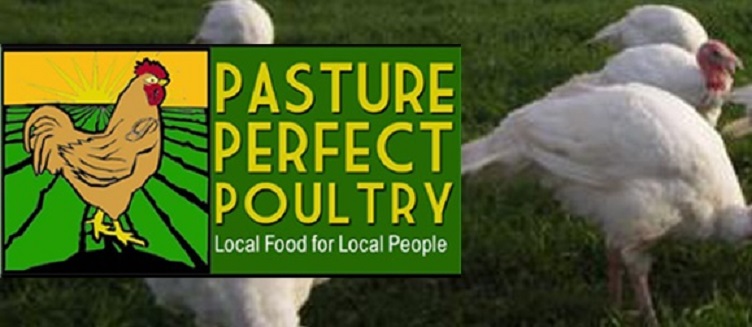
Established by Paul Grieve from the University of California, Los Angeles, Jeff McDaniel from Concordia University and Rob McDaniel from Western University, the company was fomed with an emphasis on rotational practices that allow chickens to graze and live in solar-powered and automated enclosed "chicken tractors" outdoors.
The team says waste generated from the process can enrich land rather than deplete it, reduce the amount of feed farmers need to purchase and may even result in decreasing poultry farmers' reliance on antibiotics to stave off disease. With their prize winnings, the team plans to prototype the tractors and begin marketing the technology to existing poultry companies.
And then there's MIGHTi, the team behind the MIGHTY MEALworm project. Led by University of Wisconsin-Madison students Rachel Bergmans and Valerie Stull, this startup is focused on producing edible mealworm protein powder to improve food security in the parts of sub-Saharan Africa that are most affected by drought and climate change.
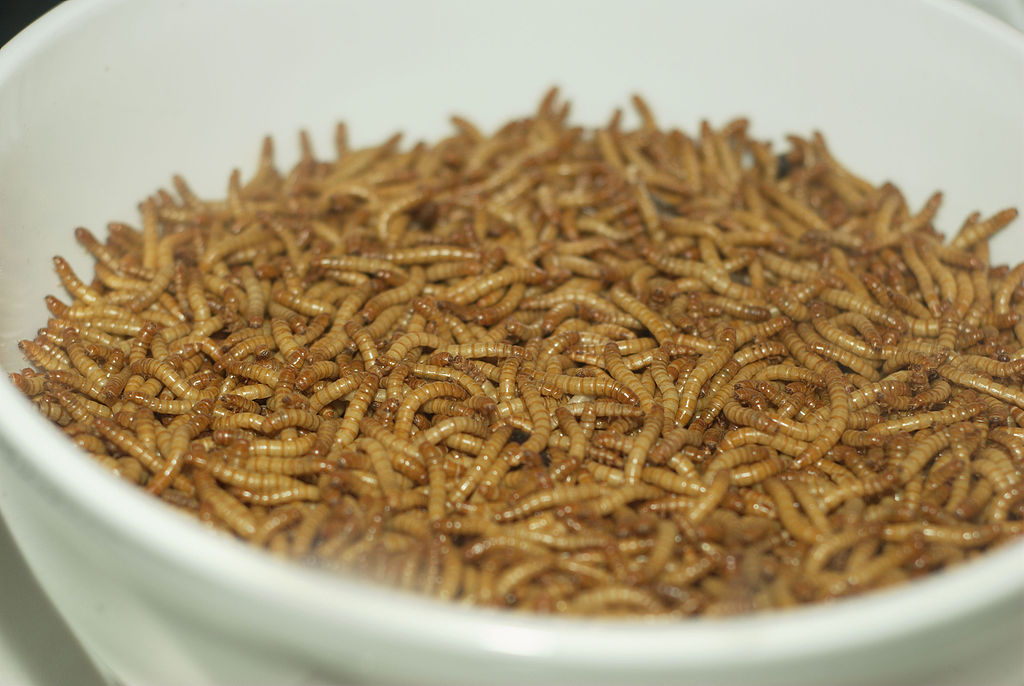
Rich in protein and easy to cultivate, meal worms are a sustainable way of addressing world hunger. Credit: Wikimedia Commons/Pengo
With an eye to the global insect market - which is growing rapidly - the team chose to grow mealworms because of the insects' appetite for a variety of foods, ability to survive on little water, and their role in recycling nutrients and waste into high quality protein. Mealworms are about 40 percent protein by weight, whereas conventional sources like chicken are about 30 to 35 percent.
In short, their company is promoting edible insect production (also called microlivestock farming) as a sustainable protein source for human consumption and animal feed - a method that not only addresses world hunger but is environmentally sound. With their share of the prize, the team will focus on micro-financing women's cooperatives in Africa and introducing the concept to areas where insect consumption is already culturally acceptable.
And last, but not least, there was Love Grain, a Cambridge, Massachussets-based startup that is seeking to forge connections between Ethiopian farmers and international markets. Co-founded by Harvard University students Aleem Ahmed and Caroline Mauldin, the company helps implement new practices and beneficial relationships between farmers and families that produce teff, a grain native to Ethiopia.
Co-founder Ahmed with a teff planting tool made by a farmer in Waliso, Ethiopia. Credit: Love Grain
Similar to millet and quinoa, teff is a species of lovegrass that is high in dietary fiber and iron and provides a good dose of protein and calcium. However, the seed is also renowned for the fact that it is much smaller than these other grains, and therefore cooks faster and requires less fuel. In spite of these benefits, farmers are often unable to sell their grain in significant quantities due to a lack of startup cash and access to foreign markets.
With the support of the prize, the company intends to finance seed and fertilizer purchases for Ethiopian producers to help them increase their yields while continuing to teach new planting practices and purchasing teff directly from farmers.
At present, there are about 7 billion people living on the planet. By 2050, another two billions are expected to be joining us. When you consider that currently over a billion people go hungry every day, these figures are rather disconcerting. But as the organizations that competed in the AIP clearly demonstrate, there are a number of innovative solutions being offered to address this problem.
And with prizes being offered to incentivize the innovation process, food security for all the world's inhabitants may prove to be possible after all.
Sources:
- HeroX.com/agprize
- HeroX.com/news/49-over-200000-in-prizes-awarded-to-agprize-challenge/
- www.thehowardgbuffettfoundation.org/
- www.40chances.com/about-40-chances/
- middleburyfoods.squarespace.com/media/
- www.news.wisc.edu/22792
- www.hooulupacific.org/
- pastureperfectpoultry.org/
- lovegrain.co/
- www.coolify.in/about-us/
- mighti.co/
